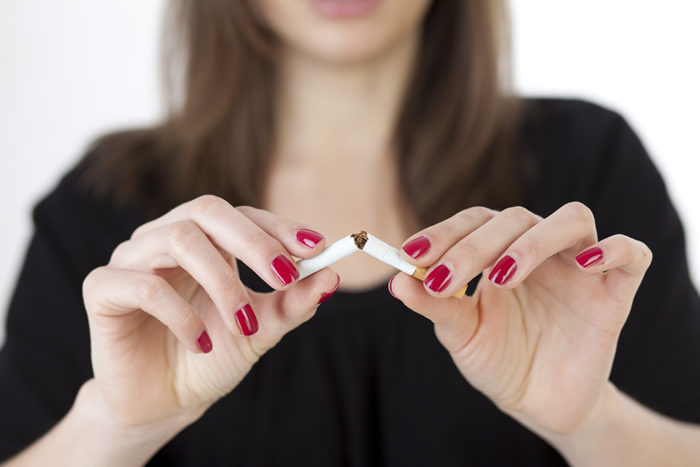
WholeFoods Magazine
Supplementing Nutritional Deficiencies Helps Smokers Quit

Thanks to public messaging, we are all aware of the negative health consequences of smoking. Cigarette smoke contains a number of poisons and toxins such as carbon monoxide, cadium, arsenic, cyanide, benzene, ammonia, formaldehyde and many more. Even nicotine is a poison, used to kill insects. Of coursem it is always advisable to quit smoking. However, there are many ways to become healthier before quitting, that will also make it easier to give up the habit later.
Proper nutrition helps protects health. The harmful chemicals in tobacco smoke cause damage to tissues and cells, which require vitamins and minerals for repair. This is how smoking leads to nutritional deficiencies and a decline in overall health. Vitamins C and E are two antioxidants the body relies on for protection. Research has shown that each cigarette depletes the body of 25 mg of vitamin C. Since vitamin C is vital to the immune system, many smokers tend to be sicker on average than non-smokers. Vitamin E is an antioxidant and one of the main vitamins used in cellular repair and building red blood cells. Smoking causes damage to the mouth, throat and many other bodily tissues that require vitamin E for repair. Researchers have shown low levels of vitamin E are correlated with higher rates of cancer.
Despite marketing messages, smoking actually causes stress. Oxidative stress occurs when there are too many free radicals and not enough antioxidants. Nicotine causes spikes in blood pressure, and the carbon monoxide in cigarette smoke actually steals oxygen from the bloodstream. These factors trigger the release of stress hormones such as cortisol. Available B vitamins are used for the production of energy, metabolizing of food and to counteract the stress. Prolonged stress can lead to serious health risks, such as anxiety, depression, premature aging and heart disease. Also, stressful situations are one of the most common triggers to smoke again after quitting.
Smoking has been shown to reduce levels of fatty acids in the brain, which damages the cellular structure of nerves and interrupts neurotransmission in areas of the brain involved with feeling of pleasure and satisfaction. These areas of the brain are essential in reward and decision-making. An omega-3 deficiency makes it harder to deal with cigarette cravings. A recent study showed that smokers taking omega-3 supplements significantly cut down on smoking levels, and showed a significant reduction in nicotine cravings.
A healthy diet rich in fruits and vegetables is a good way to get many of the nutrients required for proper wellness. Also, raw foods can actually change the perceived pleasure from smoking. Studies have shown that enzymes in raw fruits and vegetables bind with compounds in tobacco smoke to produce an unpleasant aftertaste, that the brain can learn to associate with tobacco. Raw foods are helpful in quitting smoking, however, a good diet is often not enough, and supplements are necessary to reverse some of the damage caused by smoking.
There are many excellent multivitamins and supplements that can help smokers at least neutralize some of the negative health effects of smoking, and possibly reverse some of the damage, Supplements can help make it easier to quit smoking when ready, be an important part of a good smoking cessation plan and support health after quitting.
 Matt Bucklin is the founder of Quit Co. and creator of Quit Tea, an herbal tea that helps smokers quit by temporarily supporting willpower to help them replace their habit for good.
Matt Bucklin is the founder of Quit Co. and creator of Quit Tea, an herbal tea that helps smokers quit by temporarily supporting willpower to help them replace their habit for good.
NOTE: WholeFoods Magazine does not endorse any specific brand or product. The opinions expressed in bylined articles are not necessarily those of the publisher.
Posted on WholeFoods Magazine Online, 5/2/2016







